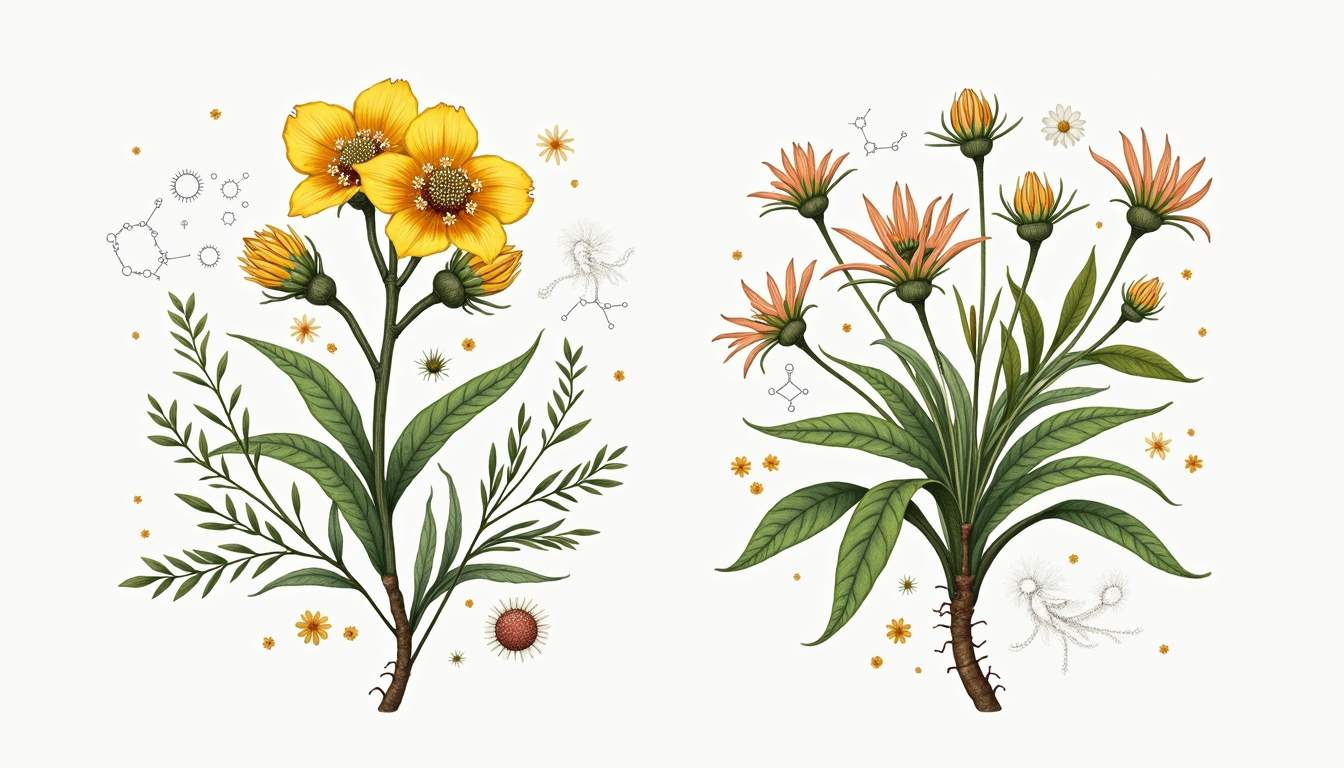Rhodiola and Bacopa are two powerful natural nootropics that have garnered attention for their potential to enhance brain function. These herbal supplements, rooted in traditional medicine, are increasingly recognized in modern wellness circles for their cognitive benefits. This article delves into the history, scientific evidence, and practical applications of Rhodiola and Bacopa, offering insights into how they can support mental performance and overall brain health.
Boost cognitive performance naturally with Rhodiola and Bacopa. Explore their traditional uses, scientific backing, and how they support memory, focus, and stress resilience.
Understanding Rhodiola and Bacopa: Natural Nootropics
The History and Traditional Uses of Rhodiola Rosea
Rhodiola Rosea, commonly known as golden root or Arctic root, has a rich history that dates back thousands of years. Traditionally used in various cultures, particularly in Russia and Scandinavia, this adaptogen was believed to enhance physical endurance, reduce fatigue, and improve mental clarity. Ancient texts suggest that it was often utilized by Viking warriors to boost their stamina and resilience during long journeys and battles.

In addition to its physical benefits, Rhodiola has been used in traditional medicine to alleviate symptoms of stress and anxiety. Its adaptogenic properties are thought to help the body adapt to challenging situations, making it a popular choice among those seeking to enhance their mental fortitude and overall well-being. Furthermore, the herb has been traditionally brewed into teas or tinctures, allowing for easy consumption and integration into daily routines. In modern herbal practices, Rhodiola is often combined with other adaptogens to create synergistic blends that further enhance its stress-relieving properties, making it a versatile addition to holistic health regimens.
Bacopa Monnieri: Ancient Ayurvedic Brain Tonic
Bacopa Monnieri, also known as Brahmi, is a staple in Ayurvedic medicine, where it has been utilized for centuries as a cognitive enhancer. This herb is revered for its ability to improve memory, learning, and concentration. In ancient texts, Bacopa was often recommended for students and scholars to support their studies and mental performance.
Research into Bacopa's properties has revealed its potential to promote neurogenesis—the growth of new neurons—and enhance synaptic communication. This has led to its classification as a nootropic, with modern studies supporting its traditional uses in enhancing cognitive function and reducing anxiety. Additionally, Bacopa is often celebrated for its antioxidant properties, which help protect brain cells from oxidative stress and damage. This dual action of supporting cognitive function while safeguarding neural integrity makes Bacopa a compelling choice for those looking to maintain mental sharpness as they age. In contemporary herbal formulations, Bacopa is frequently included in nootropic stacks, where it is combined with other cognitive enhancers to maximize its effects and support overall brain health.
Scientific Evidence and Mechanisms of Action
How Rhodiola Enhances Cognitive Function and Reduces Fatigue
Scientific studies have begun to validate the cognitive benefits of Rhodiola. Research indicates that this herb can help improve mental performance, particularly in stressful situations. One of the key mechanisms behind Rhodiola's effects is its ability to influence neurotransmitter levels, including serotonin and dopamine, which play crucial roles in mood regulation and cognitive function.

Moreover, Rhodiola has been shown to reduce fatigue and enhance endurance. A study involving individuals exposed to stressful conditions found that those who took Rhodiola experienced less fatigue and improved mental performance compared to a placebo group. This suggests that Rhodiola not only supports cognitive function but also helps the body cope with stress more effectively. Further investigations have revealed that Rhodiola may also modulate the hypothalamic-pituitary-adrenal (HPA) axis, which is responsible for the body's response to stress. By balancing cortisol levels, Rhodiola can help mitigate the negative effects of chronic stress, leading to improved overall well-being and cognitive clarity.
To experience the combined benefits of these potent herbs, consider our Rhodiola & Bacopa supplement, formulated to support cognitive health and stress resilience.
Bacopa's Effects on Memory Formation and Neuroprotection
Bacopa Monnieri has been extensively studied for its neuroprotective properties and its role in memory enhancement. Research indicates that Bacopa can improve memory recall and learning rates, particularly in older adults. The active compounds in Bacopa, known as bacosides, are believed to facilitate the repair of damaged neurons and promote the growth of new brain cells.
In addition to its memory-boosting effects, Bacopa has demonstrated antioxidant properties, which help protect the brain from oxidative stress. This is particularly important as oxidative stress is linked to cognitive decline and neurodegenerative diseases. By mitigating these effects, Bacopa may play a role in preserving cognitive health as individuals age. Furthermore, Bacopa has been shown to enhance synaptic transmission, which is crucial for effective communication between neurons. This enhancement not only supports memory formation but also improves overall cognitive processing speed, making it a valuable ally for students and professionals alike. As ongoing research continues to unveil the full spectrum of Bacopa's benefits, it is becoming increasingly recognized as a powerful adaptogen that can support cognitive resilience in our fast-paced world.
Practical Applications and Supplementation
Optimal Dosages and Potential Synergistic Effects
When considering supplementation with Rhodiola and Bacopa, it is essential to understand the optimal dosages for achieving the desired cognitive benefits. For Rhodiola, a typical dosage ranges from 200 to 600 mg per day, often standardized to contain a specific percentage of rosavins and salidroside, the active compounds responsible for its effects. These compounds are believed to help modulate stress response and enhance mental clarity, making Rhodiola a popular choice among students and professionals facing high-pressure situations.
For a reliable daily dose of both Rhodiola and Bacopa in one formula, explore our Optimize: Rhodiola & Bacopa supplement.
Bacopa, on the other hand, is usually taken in doses ranging from 300 to 600 mg per day, with a focus on standardized extracts that contain a certain percentage of bacosides. Some studies suggest that taking Bacopa for an extended period—typically 8 to 12 weeks—may yield the most significant cognitive benefits. This extended use allows the body to build up its levels of bacosides, which are thought to support neuronal communication and promote synaptic plasticity, key factors in learning and memory retention.
Interestingly, combining Rhodiola and Bacopa may enhance their effects. While both herbs can be taken separately, some individuals report improved cognitive performance when using them together. This synergistic effect may arise from their complementary mechanisms of action, with Rhodiola providing stress resilience and Bacopa enhancing memory and neuroprotection. The combination could be particularly beneficial for those engaged in demanding mental tasks, as it may help maintain focus and reduce mental fatigue throughout the day.
Potential Side Effects and Contraindications to Consider
While Rhodiola and Bacopa are generally considered safe for most individuals, it is important to be aware of potential side effects and contraindications. Rhodiola may cause mild side effects such as dizziness, dry mouth, or gastrointestinal discomfort in some users. It is advisable to start with a lower dose and gradually increase it to assess tolerance. Additionally, those with a history of bipolar disorder should exercise caution, as Rhodiola may potentially trigger manic episodes in susceptible individuals.
Bacopa is also well-tolerated, but some individuals may experience digestive issues or fatigue, especially when starting supplementation. Pregnant or breastfeeding women, as well as individuals taking certain medications, should consult a healthcare professional before beginning any new supplement regimen. It is particularly important for those on antidepressants or anticoagulants, as Bacopa may interact with these medications, potentially altering their effectiveness or increasing the risk of side effects.
Moreover, the timing of supplementation may also play a role in the effectiveness of these herbs. Some users find that taking Rhodiola in the morning helps to boost energy levels and focus throughout the day, while Bacopa may be more beneficial when taken in the evening, as it can promote relaxation and support cognitive processes during sleep. Understanding these nuances can help individuals tailor their supplementation strategies to better suit their personal needs and lifestyles.
To experience the combined benefits of these potent herbs, consider our Rhodiola & Bacopa supplement, formulated to support cognitive health and stress resilience.

Share:
When Is the Best Time to Take Turmeric? Morning vs Evening Benefits Explained
Adaptogens Explained: Benefits of Rhodiola, Bacopa and Ashwagandha for Stress, Memory, and Hormone Balance